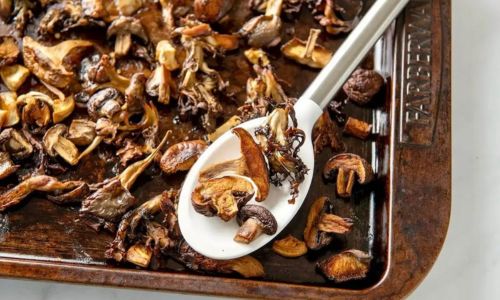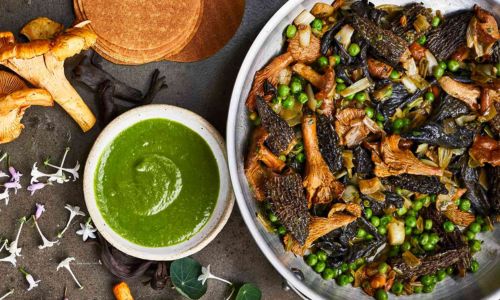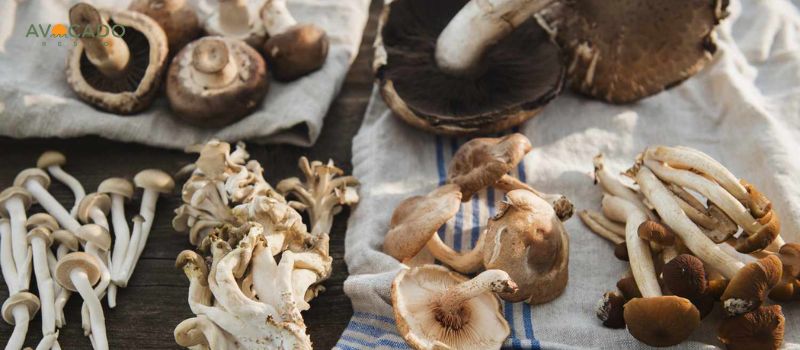Wild mushrooms are a nutritional powerhouse, offering unique flavors and a wealth of health benefits.
Incorporating these fungi into your diet can contribute to overall wellness while enhancing your meals with earthy, umami taste.
Wild mushrooms are a beloved ingredient, expertly combined with fresh wholesome elements to create nourishing dishes. Discover seven smart tips to get the most nutritional value from wild mushrooms.
Nutritional Benefits of Wild Mushrooms
Wild mushrooms are more than just a flavorful addition to meals—they offer an impressive nutritional profile that supports overall health. Here is a breakdown of key nutrients and benefits present in wild mushrooms:
Protein
Wild mushrooms provide a good source of plant-based protein.
While the protein content varies among species, mushrooms generally contain essential amino acids needed for muscle repair, enzyme production, and overall cellular functions.
This makes them a valuable protein addition especially in vegetarian and vegan diets.
Vitamins
- Vitamin D: Wild mushrooms exposed to sunlight or UV light are one of the few non-animal sources of vitamin D, which is crucial for bone health, immune system support, and inflammation reduction.
- B Vitamins: They are rich in several B vitamins, including riboflavin (B2), niacin (B3), and pantothenic acid (B5), which play major roles in energy metabolism, red blood cell formation, and nervous system health.
Minerals
- Selenium: An important antioxidant mineral that helps protect cells from damage and supports thyroid function.
- Copper: Necessary for iron metabolism, cardiovascular health, and nervous system maintenance.
- Potassium: Helps maintain fluid balance, proper muscle function, and cardiovascular health by regulating blood pressure.
Dietary Fiber
Wild mushrooms contain both soluble and insoluble fibers. They also include prebiotic fibers which promote the growth of beneficial gut bacteria, enhancing digestion and gut health.
Antioxidants
Mushrooms are rich in unique antioxidants, such as ergothioneine and glutathione, which protect the body from oxidative stress and may reduce the risk of chronic diseases like cancer and heart disease.
Beta-glucans
These are powerful polysaccharides found in mushroom cell walls that have immune-modulating properties. They stimulate immune cells and enhance the body’s defense mechanisms.
1. Choose Fresh and Variety of Wild Mushrooms
Different wild mushroom species like chanterelles, porcini, morels, and shiitakes contain varied nutrients such as vitamins, minerals, and antioxidants. Opt for fresh, seasonal mushrooms to preserve key nutrients.
2. Cook Gently to Preserve Nutrients

Cooking is essential to unlock the flavors and digestibility of mushrooms, but harsh heat can damage delicate nutrients like vitamin D and antioxidants. Use gentle methods like light sautéing, steaming, or roasting.
3. Combine with Healthy Fats
Fat-soluble nutrients in wild mushrooms, such as vitamin D, are better absorbed when eaten with healthy fats. Ingredients like avocado, olive oil, and nuts enhance nutrient uptake and meal satisfaction.
4. Pair With Fiber-Rich Foods
Wild mushrooms provide prebiotic fibers that aid gut health. Pairing them with vegetables, whole grains, legumes, and leafy greens further supports digestion and a balanced microbiome.
5. Consume Regularly for Immune Boost

Beta-glucans in wild mushrooms stimulate immune function, helping fight infections and inflammation. Including them regularly in your diet strengthens your immune system.
6. Explore Different Recipes and Meal Times

Wild mushrooms are versatile—from breakfast omelets to salads and dinner entrees—allowing varied and frequent consumption mushroom dishes throughout the day, making it easy to enjoy their benefits anytime.
7. Balance with Protein and Antioxidants
Combining wild mushrooms with quality protein (eggs, legumes, lean meats) and antioxidant-rich fruits and vegetables creates nutrient-dense, balanced meals.
Simple and Healthy Wild Mushroom Menu Ideas
Incorporating wild mushrooms into your diet doesn’t have to be complicated. Here are some easy, healthy menu ideas featuring wild mushrooms:
- Wild Mushroom Salad: Mix fresh wild mushrooms with greens, cherry tomatoes, walnuts, and light vinaigrette for a fiber- and antioxidant-rich meal.
- Sautéed Mushroom Toast: Sauté mushrooms with olive oil, garlic, and herbs; serve on whole grain toast with avocado slices for a nutritious breakfast or snack.
- Mushroom and Avocado Wrap: Fill whole wheat wraps with sautéed mushrooms, avocado, spinach, and feta cheese for a quick, balanced lunch.
- Wild Mushroom Soup: Prepare simple broths with mushrooms, herbs, and seasonal veggies for a comforting, nutrient-packed meal.
- Mushroom Stir-fry: Stir-fry mushrooms with colorful vegetables and soy sauce for a quick dinner rich in vitamins.
These easy ideas highlight how wild mushrooms easily fit into a healthy lifestyle without complex cooking, matching Avocado Resto’s fresh and wholesome ethos.
Enjoy Wild Mushroom Dishes at Avocado Resto
Experience the nourishing benefits of wild mushrooms combined with fresh, quality ingredients at Avocado Resto.
Our menu includes rich mushroom soups, vibrant salads, hearty breakfasts, and more each thoughtfully prepared to support your health.
Explore our offerings at Avocado Resto Menu and savor meals that delight your taste buds while boosting your wellbeing.
Visit Avocado Resto and discover how we celebrate the nutritional power of wild mushrooms in every delicious dish.
